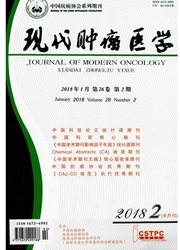

 中文摘要:
中文摘要:
目的:研究微小RNA(microRNA,miRNA)miR-200b是否介导血肿瘤屏障(blood-tumor barrier,BTB)通透性增加。方法:测量跨内皮阻抗值(TEER)、辣根过氧化物酶(HRP)渗漏量,分析血脑屏障(bloodbrain barrier,BBB)和BTB通透性的改变,应用Real-time PCR检测血脑屏障BBB和BTB大鼠脑微血管内皮细胞(rat cerebral microvascular endothelial cell RCMEC,ECs)miR-200b的表达,应用miR-200b agomir和miR-200b antagomir分别转染GECs(ECs和U87脑胶质瘤细胞共培养的细胞)后分析血肿瘤屏障的通透性改变;应用Western blot检测紧密连接相关蛋白ZO-1(zonula occludens-1)的表达;应用免疫荧光方法观察GECs紧密连接相关蛋白ZO-1和丝状肌动蛋白(filamentous actin,F-actin)结构和分布的改变。结果:与BBB相比,BTB的TEER值显著降低,HRP显著升高;与BBB的ECs相比,GECs内源性miR-200b表达显著降低;miR-200b agomir和miR-200b antagomir成功转染到GECs中;miR-200b agomir组TEER值显著升高,HRP流量显著降低,以及ZO-1表达显著升高,抑制ZO-1由内皮细胞的边缘向细胞质转移,抑制丝状肌动蛋白由细胞膜边缘向细胞中央区分布,F-actin分布于细胞边缘明显增加,应力纤维形成明显减少;miR-200b antagomir结果与miR-200b agomir实验结果相反。结论:MiR-200b介导BTB通透性增加。
 英文摘要:
英文摘要:
Objective: To investigate whether the mechanism of microRNA( miRNA) miR- 200 b nediated an increase in blood- tumor barrier( BTB). Methods: HRP flux and TEER assays revealed blood- brain barrier( BBB)and BTB permeability. Endogenous expression of miR- 200 b was detected by Real- time PCR in rat cerebral microvascular endothelial cell RCMEC( ECs) of BBB and BTB. miR- 200 b agomir and miR- 200b antagomir were transfected into GECs( ECs with U87 glioma cells co- culturing),respectively. The protein expression level of ZO- 1 was detected by Western blot. The stress fiber formation and distribution of filamentous actin( F- actin) and ZO- 1 were assessed by immunofluorescence microscopy. Results: Compared with BBB,the value of TEER significantly decreased in BTB,and HRP flow significantly increased in BTB,which resulted to an increase in BTB permeability. The endogenous expression of miR- 200b in ECs significantly decreased in BTB compared to BBB. miR- 200b agomir and miR- 200 b antagomir were successfully transfected into GECs. Overexpression of miR- 200 b inhibited endothelial leakage and restored normal transendothelial electric resistance values. Simultaneously,overexpression of miR- 200b inhibited a decrease in the protein expression level of ZO- 1. In addition,overexpression of miR- 200b inhibited the relocation of ZO- 1 from cellular borders into the cytoplasm as well as the production of stress fiber formation in GECs of the BTB. miR- 200 b silencing produced opposite results as that obtained from that of the miR- 200b over-expression group. Conclusion: miR- 200 b mediated an increase in BTB permeability.
 同期刊论文项目
同期刊论文项目
 同项目期刊论文
同项目期刊论文
 期刊信息
期刊信息
